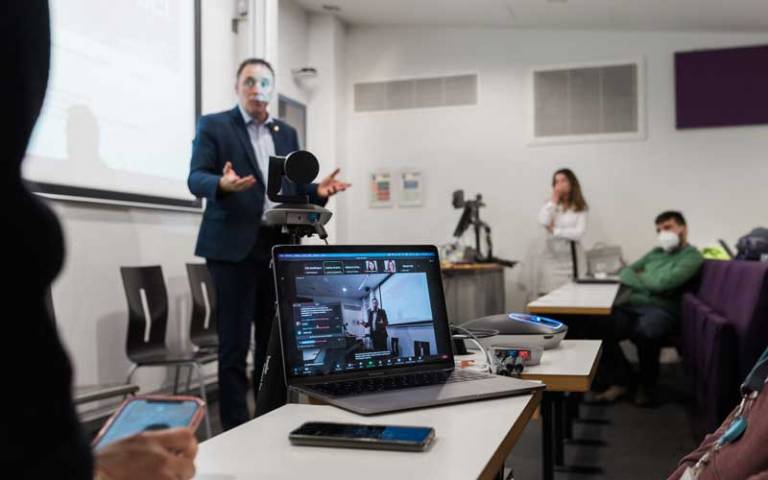We no longer have UKRI-funded studentships available. Potential candidates who may have other sources of funding available to them should contact us for further info: cybersecuritycdt@ucl.ac.uk
Cybersecurity PhD programme

The programme will provide students with core skills and knowledge at the forefront of computing (systems security, cryptography, software security, network security), crime science (cybercrime) and policy (information security management, public policy). The programme will also instil an appreciation of industry needs and the range of skills and insight needed to work effectively within the sector.
It has long been recognized that cybersecurity is a ‘wicked problem’ – one that spills across disciplines, jurisdictions, and borders of all kinds. Our approach to multidisciplinary training will ensure that doctoral students achieve deep domain-specific expertise, while being trained in other areas.
We believe that by working side by side with students from other disciplines, PhD candidates in our CDT will emerge as individuals who can identify problems that can be resolved using a range of tools and methods, as well as being confident in their ability to work effectively with experts from across the socio-technical divide.
Taught modules, skills activities, and joint research projects involving multidisciplinary teams cements their ability to work effectively in such setting. This approach ensures we develop multidisciplinary experts, rather than generalists.
The CDT provides a 4-year programme of training in cutting-edge disciplinary skills in computing, social sciences and humanities, as well as transferable skills relating to cross sector and cross disciplinary communication, teamwork, public dissemination and professional practice.
This is achieved through a combination of structured compulsory and elective taught modules and training activities, as well as an `apprenticeship’ model involving hands-on personal and team-based research under the supervision of a lead in the field of cybersecurity.
Year 1
Students complete a portfolio of training elements, which are a requirement of funding under the CDT. In Year 1, students will audit five taught modules to develop their expertise in conceptual foundations, information security management, cybersecurity, and cybercrime. They are also provided with a solid grounding in research methods.
This equips them with the skills and perspectives to solve complex cybersecurity challenges. They are assessed through the completion of a literature review, a six-month research project, a systematic literature review group project, and an integrated assessment that draws on the material delivered across the taught modules.
In Year 1, students audit five taught modules. This comprises four compulsory modules and one optional module.
The four compulsory modules are:
Compulsory 1: Information Security Management (COMP0059)
Compulsory 2: Cybercrime (SECU0043)
Compulsory 3: Analytic Methods for Policy (STEP0020)
Compulsory 4: Philosophy, Politics, & Economics of Security Privacy (COMP0063)
One optional module from:
Optional 1: Computer Security 1 (COMP0054)
Optional 2: Introduction to Cybersecurity (SECU0038)
Optional 3: Digital Technology and Policy (STEP0012)
Years 2 and 3
Taught disciplinary and multi-disciplinary training will continue in years two and three, with students attending further elective modules. Throughout the programme, shorter training sessions and activities will be used to develop transferable skills, as well as broadening student exposure to world-class research practices, knowledge and skills in cybersecurity. We also encourage our students to carry out an internship within a partner organisation. This will embed an appreciation of industry requirements, future job skills, and workplace roles. Note: We do not organise the internship but provide training and forums to help students connect with industry partners and the skills needed to interact effectively with them.
Year 4
Year 4 students receive training on grant writing and/or entrepreneurship but largely focus on completing their theses. Training on issues such as responsible research and innovation, writing up scientific research and the peer-review process, is provided throughout the programme. Students are encouraged to continue interacting with industry partners as they prepare for graduation and employment. We expect that some of our students will go on to positions with the organisations they have carried out internships with.
 Close
Close

